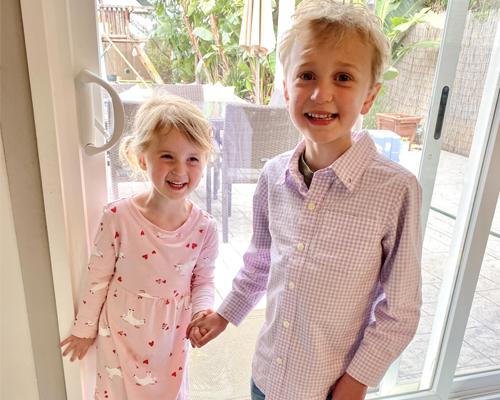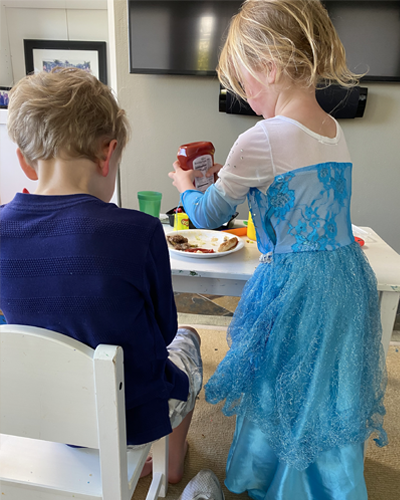
“The Rare Sibling Experience: NORD Webinar” – Erin
The National Organization for Rare Disorders (NORD) recently hosted a webinar on the “Rare Sibling Experience.” As the mother of two children, one who is diagnosed with Creatine Transporter Deficiency (CTD) and one who is not, this resonated with me and I was very curious to hear from experts on the topic. Questions about how to handle the experience of my daughter as the sibling of a child with a rare disease often swirl around in my head. My son Cadman is 6-years-old and has CTD. My daughter Emma is 3. Because of their young ages, most of my concerns are about the future, how this will affect Emma as she grows up, and wanting to make sure that as their parents, we are communicating in a healthy, constructive way. The webinar covers communication tips for siblings of various ages (very different for a preschooler vs. a teenager!).
I have heard repeatedly that having a sibling with disabilities is a blessing and helps children grow into caring and understanding adults—I am quite certain that having Cadman as a brother almost guarantees that Emma will grow into an awesome person, but I have concerns that come up because there are a lot of challenges. Most of the impact on our daughter so far seems to be positive—everything from her high levels of patience with her brother (he is very patient with her too!) and helpful nature, to her language skills developing rapidly as a baby and toddler while being exposed to his weekly in-home speech therapy sessions pretty much since she was born. At preschool and in her soccer class, Emma is very aware of other children’s needs and often quick to find ways to cheer someone up when they’re sad. She tags along for all the therapy appointments we drive to multiple times per week, and she and I enjoy our special time together, going on walks or sometimes cuddling in the car and watching a movie on my phone, while we wait for Cadman during his appointments. During meals, Emma often reminds Cadman to use his fork and will quietly pre-load his fork with food sometimes to help him out, and I recently caught her squeezing more ketchup onto his plate when he ran out. She does all these things without being asked but we certainly give her a lot of positive feedback when we see her helping her brother. We keep communication open about Cadman’s differences and challenges, and sometimes I feel like I’m figuring it all out on my own as I go, but listening to this webinar helped reinforce that a lot of what we are doing at home is right and gave me ideas of other ways to communicate moving forward.
In the webinar, Dr. David Rintell, Head of Patient Advocacy at BridgeBio, said that in preparation for the webinar, he reviewed literature on well siblings of children with long-term illness and could find no evidence that having a sibling with a rare or long-term illness is in any way harmful to children. Dr. Rintell went on to share, “Learning that you can as a family overcome adversity is an incredibly valuable life lesson that unfortunately many times we protect our children from learning because we try to protect them from knowing about it. So you are dealing with adversity, but when you’re part of a family who is living with… a child… with a serious illness… the lesson is that families are superheroes when it comes to providing care for their members.”
Listening to this webinar was overall an uplifting, empowering, relatable, and inclusive experience, and there were some emotional moments because it hit home in some powerful ways. Below are highlights of some of the points that resonated with me most. I recommend taking the time to listen to this if you also find yourself struggling with what to say and how to handle the difficult questions that inevitably arise from our children who are impacted as CCDS siblings.
- Open and honest communication with siblings is key. Remember that as parents, we are the experts when it comes to our children.
- Children’s literature is a great way to introduce challenging topics—find children’s books focused on any difficult topics or emotions you’d like to address.
- Research shows that lack of information increases anxiety in children.
- For children under 7-years-old, keep it simple—don’t go into the science of genes, but listen a lot and answer questions. Many kids want to talk about it but don’t want much detail.
- The experience of being a rare sibling can be traumatic but comes with lots of great experiences. One speaker shared about how her brother’s seizures caused disruptions to fun events. But through those experiences, she was taught how to be flexible and compassionate.
The Rare Sibling Experience – YouTube






